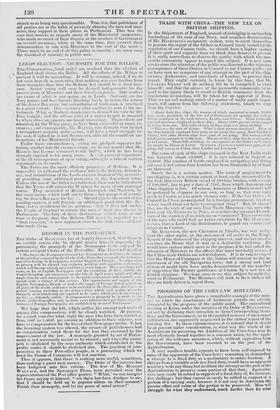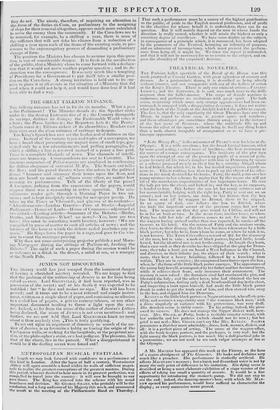PROGRESS OF THE CORN-LAW AGITATION.
Tin: Agriculturists have given a remarkable example of the manlier in which the enactments of barbarous periods are silently abrogated by the progress of the public mind. The agricultural meeting at Kelso, under the auspices of the Duke of BITCCLEUCH, set out by declaring their intention to form Corresponding Societies; and the Government, as in the parallel instance of unstamped publications,bas apparently acquiesced in the virtual repeal of the existing law. In these circumstances, it is natural that it should be at present under consideration, in what way the whole of the Associations for procuring the Abolition of the Corn-laws may be most efficiently bound together in a common union, by the application of the selfsame measures, which, without opposition from the Government, have been resorted to on the part of the Agriculturists. A very needless trouble appears to have been selfimposed by some of the opponents of the Corn-laws ; consisting in demanding a change to a fixed duty as a preliminary to entire freedom. A change from a variable scale to a fixed duty, would bare no apparent tendency to do any thing but facilitate the attempt on the part of the Agriculturists to preserve some portion of that duty. Agriculturists may easily be rallied in support of a fixed duty of, for instance, five shillings; but they cannot so easily be rallied in support of a portion of a varying scale, because it is not easy to determine the precise effect and value of the portion to be preserved. Men will struggle for what they understand, much harder than for what
they do not. The nicety, therefore, of requiring an alteration in theform of the duties on Corn, as preliminary to the assigning of steps for their removal altogether, appears much more calculated to serve the enemy than the community. If the Corn-laws are to be removed, for example, by a shilling a year, there is none of the sufferers that will not take his chance from a reduction of a shilling a year upon each of the items of the existing scale, in preference to the supererogatory process of demanding a preliminary change of form.
The position the Ministry has chosen to assume upon this question, is one of considerable danger. It is fresh in the recollection of the public, that a Ministry chose to come forward with a declaration that it would not move another popular question ; and its destruction was the consequence. It was very much like a tempting of Providence for a Government tI put itself into a similar position on the Corn-laws. A strong invitation is held out to its :Incinies to place it at all events in the situation of a Ministry that did good when it could not help it, and would have done less if it had been able to find a way.



















 Previous page
Previous page